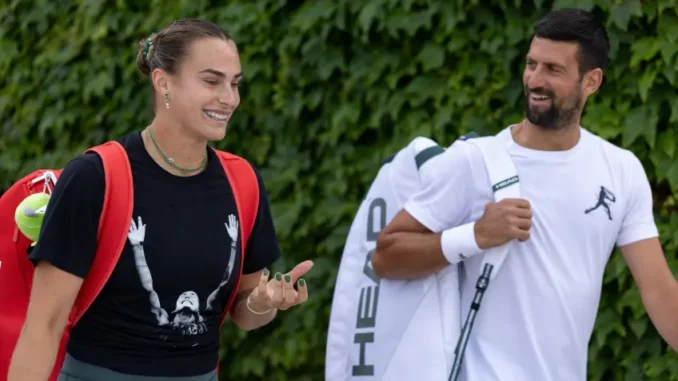
As the pristine grass courts of Wimbledon welcome the world’s tennis elite for the 2025 Championships, a compelling narrative unfolds off the court, where Novak Djokovic, the seven-time Wimbledon champion, has stepped into the spotlight to defend Aryna Sabalenka following her controversial remarks about Coco Gauff after their French Open final clash. The drama, which erupted in early June, has lingered in the tennis world, but Djokovic’s empathetic perspective, combined with the reconciliation between Sabalenka and Gauff, has shifted the focus toward sportsmanship and resilience as the tournament begins on June 30.
The controversy began after Gauff, the 21-year-old American prodigy, defeated Sabalenka, the world No. 1, in a thrilling French Open final, 6-7(5), 6-2, 6-4, securing her second Grand Slam title. In the emotional aftermath, Sabalenka’s post-match press conference stirred debate when she attributed her loss to her own errors rather than Gauff’s skill, stating, “I think she won the match not because she played incredible. Just because I made all of those mistakes, from kind of easy balls.” Sabalenka, who committed 70 unforced errors compared to Gauff’s 30, also suggested that Iga Swiatek, whom she defeated in the semifinals, would have beaten Gauff in the final. These comments sparked backlash from fans and pundits, who criticized Sabalenka for downplaying Gauff’s achievement.
Djokovic, speaking at a pre-Wimbledon press conference, offered a nuanced defense of Sabalenka, emphasizing the emotional toll of high-stakes matches. “We all in the end of the day are human beings that have difficult emotions that they have to handle right after losing a big match, like in a Grand Slam final,” he said. He acknowledged the challenge of maintaining diplomacy in the heat of defeat, noting, “When you’re so heightened with emotions, your blood is running hot, it’s not always easy to suppress that and put diplomacy ahead.” Djokovic, a 24-time Grand Slam champion, drew from his own experiences, citing the importance of respecting opponents while recognizing that post-match comments can sometimes be misinterpreted. “Maybe it came out in the wrong way, but she didn’t mean to disrespect Coco,” he added, urging fans to consider the context of Sabalenka’s emotional state.
Sabalenka, reflecting on her remarks, later admitted they were “completely unprofessional.” In an interview with Eurosport Germany, she expressed regret, saying, “I let my emotions get the better of me. I absolutely regret what I said back then. You know, we all make mistakes. I’m just a human being who’s still learning in life.” She revealed that she had privately apologized to Gauff, writing to her to ensure she knew “she absolutely deserved to win the tournament and that I respect her.” Sabalenka’s public clarification on Instagram the day after the final further underscored her intent to give credit where due: “Coco handled the conditions much better than I did and fully deserved the win. She was the better player yesterday, and I want to give her the credit she earned.”
Gauff, for her part, responded with characteristic grace. During her own press conference, she countered Sabalenka’s remarks about Swiatek, stating, “I don’t agree with that. I’m here sitting here [as the champion]. No shade to Iga or anything, but last time I played her I won in straight sets.” She acknowledged the emotional intensity of the match, adding, “I was a little bit surprised about the comments, but I’m going to give her the benefit of the doubt. I’m sure it was an emotional day, emotional match.” Gauff’s poise was further evident at Wimbledon, where she emphasized her desire to move forward without fueling negativity. “I’m not the person that will fuel hate in the world,” she said. “I preach love, I preach light. I just want us to be kumbaya, live happily, hakuna matata, and be happy here.”
The reconciliation between Sabalenka and Gauff has been a highlight in the lead-up to Wimbledon. The two were spotted practicing together and even filmed a lighthearted TikTok dance on Centre Court, lip-syncing to a 1990s hit, signaling that any tension had been resolved. Sabalenka, addressing the media, affirmed, “We are good. We are friends,” while Gauff expressed hope that the controversy would fade, noting the unfair criticism Sabalenka faced. Their camaraderie has drawn praise from peers like Frances Tiafoe, who remarked, “I’m happy to see that they turned the page about it. That’s the biggest thing, because they’re the best players in the world.”
As Wimbledon unfolds, Sabalenka, the top seed, begins her campaign against Canadian qualifier Carson Branstine, while Gauff, seeded No. 2, faces Dayana Yastremska. Both players are poised for deep runs, with Sabalenka aiming for her first Wimbledon title and Gauff chasing a rare Channel Slam, last achieved by Serena Williams in 2015. Djokovic’s defense, rooted in his own experience of navigating the emotional highs and lows of tennis, serves as a reminder of the sport’s unique blend of competition and camaraderie. As he prepares for his own quest for a record-equaling eighth Wimbledon crown, starting against Alexandre Müller, Djokovic’s words resonate: “It’s always important to pay respect and acknowledge the success of your opponent that just beat you.” In a sport where rivalries burn bright, this episode underscores the humanity and mutual respect that define tennis at its best.
Leave a Reply